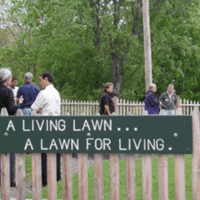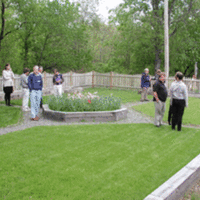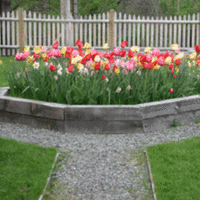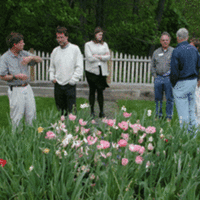Marblehead Organic Lawn and Garden Demonstration Project
Project Details
Year: 1999-2000
Location: Marblehead
Project Manager: Patricia Beckett
Partners: Marblehead Recreation, Parks & Forestry Department, Marblehead Environmental Coalition, Marblehead Board of Health.
The Story of Marblehead's "Awareness through Education" Campaign and Organic Lawn and Garden Demonstration project
MPAC, a member organization in the Marblehead Environmental Coalition, is a local, non-profit, citizens' activist group which has been running a successful "Awareness through Education" campaign in Marblehead around pesticide issues for the past three years. In 1998, MPAC received their first TURN Grant to continue their awareness raising efforts and to build the Organic Lawn and Garden Demonstration Site: "A Living Lawn...A Lawn for Living." The Demonstration Site was constructed in response to homeowners' demands for more information on "how-to" grow grass and gardens without the use of toxic chemical pesticides. This project aims to provide Marblehead residents with an on-going educational resource for organic turf and garden management, while serving as a model for other communities in Massachusetts to do the same.
In 1999 through 2000 Marblehead developed the state's first municipal organic lawn demonstration site that now serves as a resource for Marblehead residents (and others) interested in alternatives to pesticides. Town officials working with local citizens also developed the state's first Organic Pest Management Policy. MPAC developed educational materials about pesticides and organic lawn care and continues to hold educational seminars for professional landscapers and the public, and to mentor other community groups.
The plot measures approximately 2,000 sq. ft. and is situated on Everett Paine Boulevard in Marblehead, on a piece of town-owned land. The project has been funded for two consecutive years by the Toxics Use Reduction Institute (TURI) at UMASS, Lowell, and the New England Grassroots Environmental Fund.
The Problem being Addressed
During a typical year on suburban lawns across the nation, over 67 million pounds of toxic pesticides are applied in pursuit of a perfect lawn and garden. Homeowners are indeed the biggest users of the vast array of toxic chemical pesticides that have spawned the growth of the lawn care industry. Unfortunately, most homeowners are unaware of the facts regarding the health hazards caused by exposure to these chemicals. Nor do they fully understand the damaging impact these toxins also have on the health of our natural environment. In the town of Marblehead, Massachusetts, a three-year "Awareness through Education" campaign launched in 1997 around pesticide issues by the Marblehead Pesticide Awareness Committee (MPAC) met with a resoundingly positive response from the public. However, "seeing is believing" for many people, and throughout the years of MPAC's campaign, the call for an example of an organic lawn and garden has been repeatedly expressed as a real need in the community. "A Living Lawn...A Lawn for Living: Marblehead's Organic Lawn & Garden Demonstration Project" sought to answer that call through the development and maintenance of an organic lawn and garden demonstration site. This Demonstration site will now serve as an educational resource for Marblehead residents interested in eliminating toxic chemical pesticides from their home and town landscape, while serving as a model for communities in Massachusetts to do the same.
Goals of the Project
The primary goal of this project was to construct a healthy, attractive lawn, with border gardens, without the use of synthetic, toxic chemical pesticides. Only natural, organic horticultural and landscaping practices and products (easily replicated by and available to the average homeowner) would be used for the development and maintenance of a demonstration lawn site. A second goal was to raise awareness among homeowners of the hazards of toxic lawn care and garden chemical pesticides, and the many natural, organic alternatives available to them, thereby encouraging the reduction and eventual elimination of the use of lawn and garden care pesticides by Marblehead's homeowners. A third goal was to encourage local landscaping and garden center businesses to offer organic programs and products to Marblehead residents, and to invite their participation in the Project through donations of services, product and expertise. The final goal was to broaden our outreach to other communities interested in pesticide awareness and toxics use reduction work.
Vision to Action - How the Project Goals were Achieved
The Demonstration Site - The Recreation, Park & Forestry Department of the Town of Marblehead allocated the plot of land, expertise, labor and equipment needed to clear the site, and build and grade the plot. Chip Osborne, an MPAC member and local horticulturist, florist and greenhouse owner, completed the design and spear-headed the implementation, utilizing his knowledge of natural, organic horticultural and landscaping practices and products. Compost, the key to a good organic lawn and garden program, was provided by the Town.
Education and Outreach - Together with the Recreation, Park & Forestry Department, MPAC developed a series of educational classes on organic lawn horticultural and landscaping techniques and products, and other related topics (i.e. soil health; compost; seed selection; landscape weed control; biological controls; beneficial "pests"; backyard bird gardening, IPM; etc.). We held two Business Conferences for local landscapers and public land management professionals on the growing market for organic, natural landscaping services and products. We also held a Public Information Forum on Pesticides, co-sponsored with our local League of Women Voters, attended by approximately 100 Marblehead residents and run on our local cable TV station. A brochure explaining "Simple Steps to a Living Lawn" has been developed for distribution. We have compiled a photographic history of the construction of the site from its beginnings, for display. Informational/educational signage for the site will be installed and updated regularly. We have also been recording the construction on video in partnership with students from our High School's Video Department. Additionally, an alternative to the yellow warning signs found on pesticide-treated lawns are in the works to award and recognize homeowners who "go organic." Adjacent to the site, a Pesticide Information Center is being developed that will feature educational materials on: toxicity and potential health and environmental effects of synthetic lawn and garden pesticides; the benefits of organic lawn and garden care, and specific "how-to" guides on related lawn and garden topics (pest and weed control; mowing techniques, composting, native plantings, etc.) - all gathered from a wide-range of sources. As a result of their work, MPAC was asked to work with Town of Marblehead, Board of Health, on developing an Organic Pest Management Policy for the Town of Marblehead Public Lands, now being considered for adoption. Click here to view the Town's Statement on Pesticides.
MPAC continues to respond to numerous inquiries from communities throughout Massachusetts regarding our campaign. The following are some of the towns and communities that have made inquiries and sought support for the formation of their own pesticide awareness groups:
Attleboro, Boxford, Danvers, Gloucester, Hamilton-Wenham, Haverhill, Hingham Ipswich, Lynn, Lynnfield, Manchester-by-the-Sea, Reading/North Reading Salem, Sciatute, Sharon, Sherborne, Swampscott
Finally, MPACs work has been featured in articles in The Boston Globe, The Marblehead Reporter and the Boston Parents' Paper (June 2000).
The Benefits of an Alternative Approach to Lawn Care
By teaching homeowners how they can "do without" toxic chemicals in their lawn and garden care program, this project will affect the community health in each neighborhood. Young and old residents, pets and wildlife, will all benefit as more and more homeowners learn organic lawn and garden care and choose not to use pesticides. Marblehead's younger residents, it's students, will be benefit from the educational opportunities hands-on involvement in the lawn and garden maintenance will provide them. Local landscaping and garden businesses will be affected by the heightened awareness in Marblehead of the dangers inherent in pesticides. They will be encouraged by the changing market demand to carry alternative products and to offer ecological, organic lawn and garden care services, benefiting the entire community by reduced commercial use of pesticides in Marblehead. If our Town Organic Pest Management Policy passes, town workers and all those who utilize town-owned land will have reduced risks from pesticides. Marblehead is a peninsula, surrounded by the sea, and has 12 natural ponds scattered throughout the town. The run-off from lawns finds its way into our harbor, ocean, and ponds, all of which are well used for recreational purposes by the community. The fragile marine ecosystem that is so much a part of Marblehead's history and character will also benefit from the Projects' promotion of organic alternatives to toxic lawn care products.
MPAC has been fielding inquiries throughout the three years of our campaign from nearby towns on pesticide issues. The establishment of this project as a model has already benefited neighboring communities in implementing their own toxic use reduction efforts. The overwhelmingly positive response our campaign has received from Marblehead citizens, and from other communities, has supported our view that the citizens of Massachusetts are concerned about the health effects of toxic chemical lawn and garden pesticides and are ready to change to an organic approach. Now, through the Demonstration Site, MPAC has shown them that it is feasible!
This page updated Friday January 30 2015



